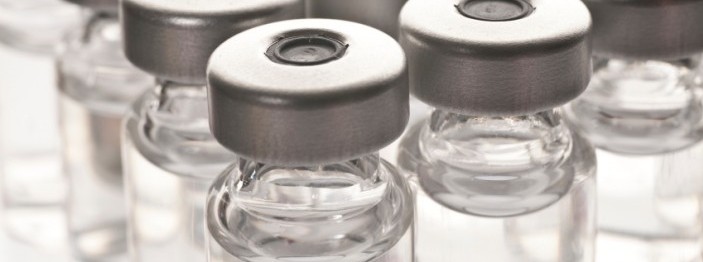Is vaccination effective in MS? – Part 2
In Part 1 we looked at the safety of different vaccines in people with MS. In this article we’ll look the impact of MS medications on the effectiveness of different vaccines.
MS is characterized by an abnormal immune reaction, in which the body’s own defences attack the tissues of the brain and spinal cord. All of the MS medications work by targeting different aspects of this immune response. But this same immune response is needed for vaccines to work.
Vaccination introduces an antigen (a substance that induces an antibody response) from a virus or bacterium into the body so that the immune system will learn to recognize it. This enables your immune response to respond more vigorously if you encounter that disease-causing organism again. MS medications quieten down the immune response, and so a possible consequence is an impairment of the body’s ability to mount an antibody response to a vaccine. This means that the vaccine may be less effective or ineffective against a particular disease.
The impact of MS medications on the effectiveness of vaccines is largely determined by how a specific drug works. So let’s look at the medications one by one.
Interferons (Avonex, Betaseron/Extavia, Rebif): These injectable medications “interfere” with viruses so they would not be expected to have an impact on viral vaccines (e.g. influenza, shingles, etc.). And in fact several studies have found that interferons do not impair a person’s response to the flu vaccine (Mehling and colleagues. PLoS One 2013;8:e78532; Schwid and colleagues. Neurology 2005;65:1964-1966). More specifically, one study found that interferons did not interfere with the H1N1 (swine flu) vaccine (Olberg and colleagues. Mult Scler 2014;20:1074-1080).
Copaxone: This injectable medication promotes a shift to less inflammatory immune response, so virus vaccines are less likely to be effective (Pellegrino and colleagues. Vaccine 2014;32:4730-4735). In general, the effect of Copaxone on vaccines has not been adequately examined. In one study of H1N1 vaccination, only 1 in 5 people received adequate protection (Olberg 2014). So more than one vaccine dose may be needed.
Aubagio: This oral therapy blocks the proliferation of activated immune cells (T cells) but generally doesn’t reduce the number of immune cells available to fight infection. The TERIVA study reported that Aubagio 14 mg doesn’t appear to impair the immune response to seasonal flu vaccines (Bar-Or and colleagues. Neurology 2013;81:552-558). Over 90% of people mounted an immune response to the H1N1 vaccine, and 77% responded to the H3N2 flu vaccine. A separate study found that the immune response to the rabies vaccine (a new antigen) was somewhat lower than normal, but everyone did achieve protective immunity (Bar-Or and colleagues. ECTRIMS 2013; abstract P622).
Tecfidera: This oral therapy can reduce the number of immune cells that are available to fight infection, which may alter a person’s response to vaccination. However, no studies have been done, and the effectiveness of vaccines during treatment is unknown.
Gilenya: This oral therapy reduces the number of immune cells in the circulation by sequestering some in the lymph nodes (Mehling and colleagues. Neurology 2008;71:1261-1267). Other immune cells (called effector memory T cells, or TEMs) remain available to fight infections. People taking Gilenya show less of a response to seasonal flu vaccines and to booster shots (such as tetanus), but most are able to mount a vaccination-related immune response (Kappos and colleagues. Neurology 2015; epublished January 30, 2015).
Tysabri: This infusion drug acts primarily by blocking activated immune cells from entering the central nervous system rather than by modulating the immune response. However, Tysabri will impair the vaccination response so a second vaccination may be needed (Olberg 2014). One study found that Tysabri did not impair the response to a booster shot against tetanus (Kaufman and colleagues. J Neurol Sci 2014;341:22-27).
Lemtrada: This infusion drug reduces the number of immune cells in the circulation, so it has the potential to impair a vaccination response. However, one small pilot study found that people were able to mount a response two bacterial vaccines (for pneumonia and meningitis), and to the DTP (diphtheria/tetanus/polio) booster shot (McCarthy and colleagues. Neurology 2013;81:872-876). The study noted that the vaccine response may be impaired if you’re vaccinated in the first two months of receiving Lemtrada.
Corticosteroids: These medications, used to treat acute relapses, suppress the immune response, so there is a potential for a reduced response to vaccination. The impact of IV or oral steroids on the vaccine response has not been studied in MS.
Before starting an MS medication, it’s generally advisable to get up to date with any booster shots you’ve been putting off, and to ask your doctor about other vaccines you should have (such as hepatitis A and B). Live attenuated vaccines should be avoided if you are taking any MS medication – they can worsen MS symptoms or, in rare cases, actually cause the disease you are trying to prevent.
Share this article
Facebook Twitter pin it! Email
Related Posts
Back





